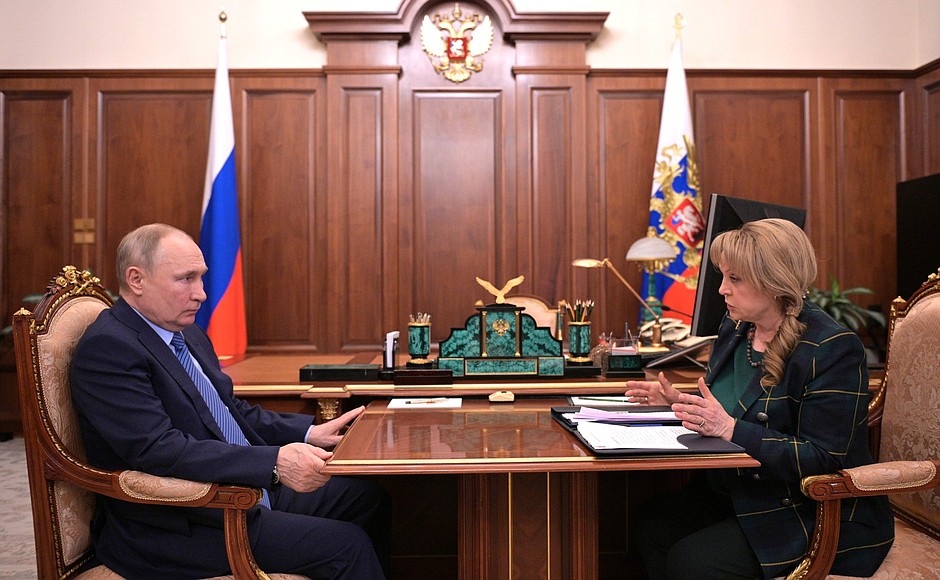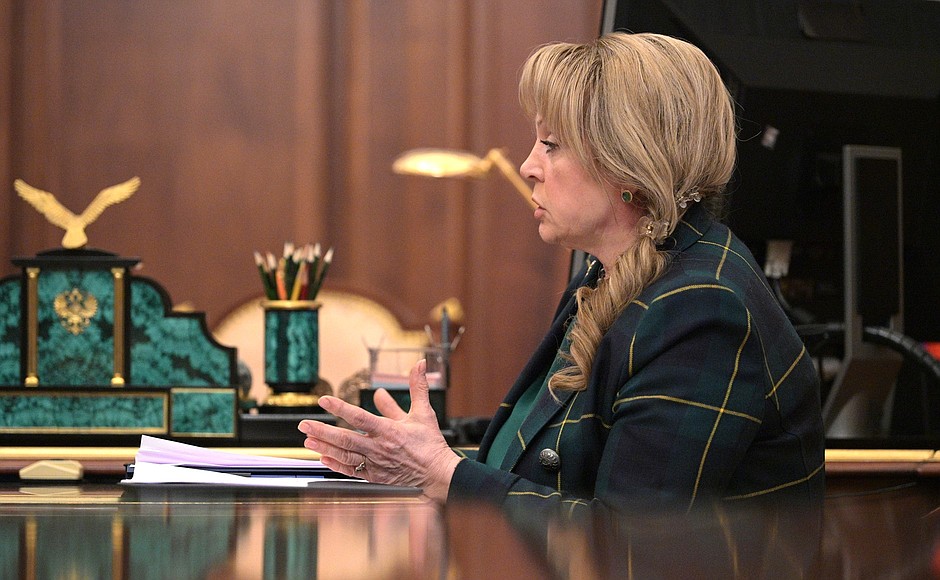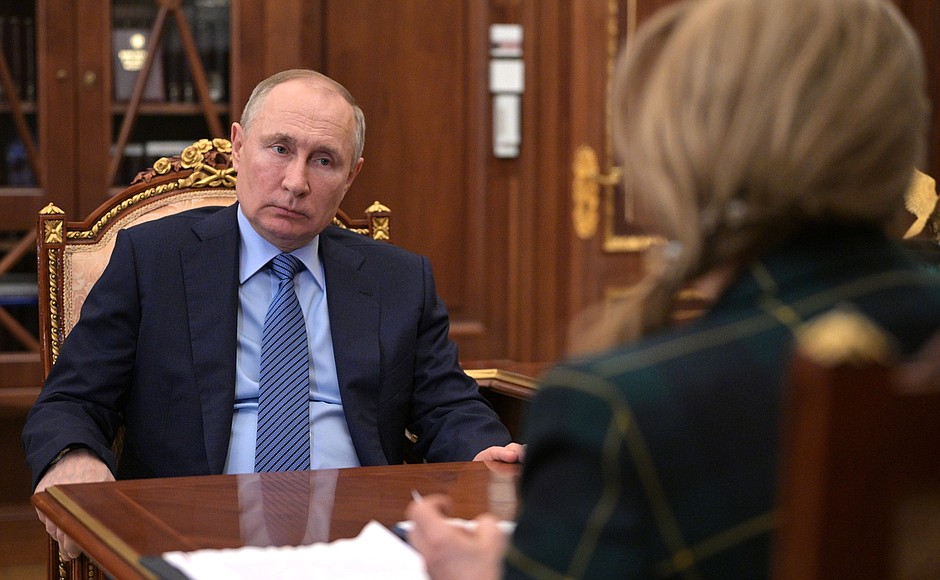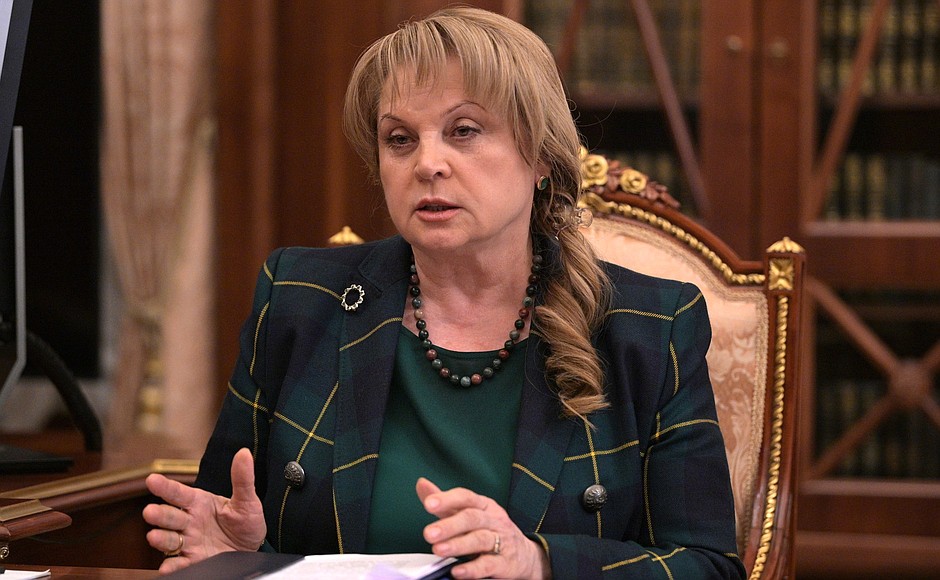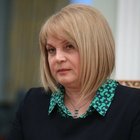President of Russia Vladimir Putin: Ms Pamfilova, you wanted to talk about the work over the past five years, didn’t you?
Chairperson of the Central Election Commission Ella Pamfilova: First of all, I would like to thank you for supporting, as always, several of our initiatives. As a result of your support, they have already been implemented. This also applies to the procedure for providing information on the convictions of nominees, increasing the powers of the Central Election Commission, and a number of measures aimed at the further dynamic development of the entire electoral system of Russia. Thank you very much, Mr President, it is really worth a lot.
But I would like to take advantage of this meeting and express my gratitude to my colleagues in the previous composition of the CEC for the tremendous work that we did together, because as a result of that work we now have a really very dynamically developing electoral system, which is open, transparent, accessible and convenient for our voters, and which is very responsive to the needs of society. Many thanks to everyone who took part in this.
Vladimir Putin: I join you in your words of gratitude.
Ella Pamfilova: Thank you.
Vladimir Putin: We have a major election campaign to the State Duma and in the regions coming up.
Ella Pamfilova: Yes, I agree. What is very important is that the main result of these five years has been a significant increase in the confidence of our citizens both in the elections themselves and in the electoral system. I believe that every day we should work hard to justify this confidence and to improve it.
For the first time, the same members of the Central Election Commission had to conduct three major election campaigns. The nationwide voting on amendments to the Constitution was, naturally, the main challenge. Thank God, the system withstood the test.
I have not spoken about it yet, but now I want to admit that in fact, there were more than enough of our opponents who wanted to, if not disrupt the voting, at least discredit it. That is, we worked in quite a difficult environment: all over the country, they tried to put pressure on election commission members so that they would leave the commissions, not show up at the voting and stop working, thus trying to destabilise the work of the commissions. But again, the system is stable, and it survived all that. Our colleagues in the regions came to literally everyone – in the taiga, tundra, at sea, on horses, helicopters and boats – to give everyone the opportunity to vote.
Our staff did everything in their power to reach everyone, and I think it is very unfair that our opponents – you like to call them partners sometimes – and those helping them often try, using ‘pseudo’ truth, to diminish the work of these wonderful people (there are almost a million of them; they mostly carry out a social mission), or even worse, to discredit their work.
There has been a stereotype for many years. You know this saying that it does not matter how people vote, but it matters how the votes are counted. I want to rephrase it like this: it is very important how people vote and it is no less important how the votes are counted, which depends on those who do the counting. And this stereotype exists, even though in some Western countries it is officials who count the votes and they believe that our commission comprises only officials who blindly follow the orders of their bosses and provide the result they need.
It is exactly the other way round, because the principle of forming the commission involves a system of checks and balances, internal monitoring and crosschecking, because at least half of the people in our commissions must represent political parties. And almost all existing parties and their representatives are present in the commissions. By the way, the law gives these parties priority to appoint representatives, including so that citizens can delegate their own representatives from their communities. That it, the commissions comprise people of various professions, beliefs and political stances, and represent the entire huge socio-political cross-section of the community.
Moreover, there’s this second, I would say, popular but false stereotype that has been hammered into the heads of the people that the electoral commissions are only and totally about officials. Under the law, members of municipal authorities and state officials cannot make up more than 50 percent of the commission staff. Over this time, their number in regional and territorial commissions has fallen by half to a maximum of around a quarter in some regions, that is not more than a quarter. And if we look at the largest commissions, the district ones, officials account for less than 6 percent. Can this be described as an internal administrative resource?
No, our commissions are a cross-section of our society.
As for the external administrative resource, major changes have taken place in the past years, and this resource has been reduced to a minimum thanks to several factors. First of all, a much tougher criminal and administrative punishment has been approved for collusion and falsification attempts.
On the other hand, we have created an extremely transparent system so that even if anyone has a desire to improve their voting results, their actions towards this immediately become public knowledge. In other words, we have made this system transparent for public control, which is a major achievement. We also have an internal control system, which I have already mentioned, and external control in the form of the observer community, which is one of the largest in the world. I cannot recall any other country with a comparable number of observers.
Moreover, we created one more system, the institute of public observers, in 2018. They complement observers representing the parties and candidates. Last time we had 255,000 observers during the elections, or at least three or four people per polling station. This multistage control system guarantees a reliable calculation of election results.
What else can I report? Our commissions are being renewed. New-generation members have been appointed to them; their average age is 42. They are people who are open to new technologies. Since the digital reality is not a distant future but is already with us, we have created unique software. I would describe it as an interactive notepad for our commission members, which is very important because they must have high standards of professional training. This is a kind of a virtual book for the commissions.
Here is an example. The Central Election Commission prepared similar books, in print form, for every election campaign. Each book had nearly 1,000 pages, and we needed to print some 150,000 copies of these thick books and to dispatch them to commissions all over the country.
An interactive notepad can save at least 6,000 trees a year, not to mention the cost of the paperwork. As an environmentally conscious person, I am all for digitalisation. Apart from everything else, digitalisation has one more huge advantage, the environmental component, which allows us to save not only temporal and social resources, but also non-renewable resources such as transport and fuel. I regard this as a very positive prospect, which is why we are working on digitalisation so energetically.
And of course, the most important thing is our Mobile Voter, which allows people to save both money and time, and it is very popular now: about 13 million of our citizens have used the app. Although quite recently, back in 2016, we used absentee ballots. Now, many probably have forgotten about that, but it is such an energy-intensive, resource-intensive and costly anachronism. Now, a person can log in to the integrated public services portal and vote anywhere in the world.
People with disabilities are especially grateful for remote electronic voting, which we are developing, because there are a lot of active people in this group, and this project gives them additional opportunities. Now, while improving the traditional form of voting, we are also very closely involved in improving the voting environment for this group of our citizens. We have moved almost 90 percent of voting sites to first floors, and already 60 percent of them fully meet all the barrier-free environment conditions, because many, especially young people with physical challenges, do not want to vote at home. They want to come to the polling station, and here volunteers help us, too. By the way, I want to say that we not only work together with volunteers, but last year, in this difficult year, many of our committed employees became volunteers and visited citizens in need.
But if we go back to digitalisation, QR coding of protocols has significantly accelerated their processing. In 2016, only up to 30 percent of all protocols of the Vybory (Elections) State Automated System were processed by midnight, while now the figure exceeds 90 percent. Moreover, we can avoid the human factor, technical errors and re-entry of protocols.
The video surveillance system, which was implemented throughout our country at your initiative, is the largest one in the world. And this is also an additional element of transparency.
The number of ballot processing systems has increased 2.5-fold during this time, because they are trusted by both parties and citizens; that is, we will continue to expand their use.
Our unique information centre provides complete information. We are developing digital services; approximately 17 are ready for operation. These services will be available to all participants in the election process, primarily for the voters and also for the parties and candidates. We are now preparing services for observers, the media and, of course, for commission members.
One of the most popular services, which we have already launched, will be used in the regional elections and we have tried it out during pilot projects. It is an electronic signature collection service, which allows collecting signatures through the unified portal of public services (gosuslugi). I hope that our legislators will support this idea soon, so that we can use it also during federal elections.
I can go on talking about what we have accomplished during this period of time. However, I would like to point out that digitalisation is not an end in itself but a means of additional improvements in the intrasystem network. Intrasystem management, personnel renewal, new training technologies and so on constitute a complex of measures we are taking to create comprehensive guarantees of the election rights of our citizens, so that nobody can question the legitimacy of our elections.
Vladimir Putin: Ms Pamfilova, we are going to have elections in September. Hence my question: have you ensured the financial preparations for these elections?
Ella Pamfilova: I would like to say that we are considering several options. When you issue an executive order setting the start of the election process in late May or the middle of June, we must be ready to say which format we have chosen. Depending on the pandemic and many other factors, we will have to decide whether the elections can be held on the same day or over a period of three days. Depending on the option we choose, we must take into account everything such as the availability of PPE and a number of other factors.
We have prepared several scenarios. I would like to say that we do not foresee any problems, thanks to your support, and the Government is meeting us halfway. In other words, nothing seems to be actually amiss regarding the scenarios we have.
Vladimir Putin: Good.
<…>
